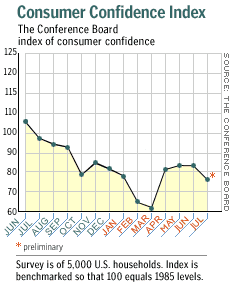NEW YORK (CNN/Money) -
For months, U.S. businesses have been skeptical about the economy's prospects, despite the rosy predictions of economists, while consumers have continued to spend money, keeping the economy afloat.
But if recent surveys are any indication, those roles apparently have reversed -- just as businesses feel the first faint stirrings of optimism that the second half of 2003 will get a boost from tax cuts, low interest rates and more, consumers are beginning to voice their disappointment with the longest labor-market slump since World War II.

The latest consumer sentiment survey from the Conference Board, a New York research firm, was surprisingly weak in July, as consumers' comfort with the present and optimism about the future both crumbled under the weight of labor-market weakness.
"Ultimately, for the economic recovery to sustain itself, we have to see the labor market improve," said Ethan Harris, chief economist at Lehman Brothers. "As the tax-cut benefits fade, consumers will look for more fundamental reasons to spend money, and there will have to be some job growth."
More than 2.5 million jobs have been lost since March 2001, when economists believe a recession began. Though the recession apparently ended in November 2001, labor market weakness has continued.
Signs of job turnaround
Early signs of a turnaround for jobs have surfaced. The number of new weekly claims for unemployment benefits dipped last week below 400,000 -- a benchmark for job market pain -- for the first time since Feb. 8. Job cut announcements have dropped in recent months, according to outplacement firm Challenger Gray & Christmas, which keeps track of them.
And a survey by the National Federation of Independent Business showed the percentage of small-business owners -- the nation's most important employers -- expecting the economy to improve in the next six months matched its highest level ever in June.
"Jobs are a lagging indicator, and other economic indicators suggest the economy is in fact on the mend. We still expect it will continue to improve through the rest of the year," said Oscar Gonzalez, economist at John Hancock Financial Services.
But consumers might need some convincing.
The Conference Board's survey results found the percentage of consumers who find jobs hard to get is climbing, while the percentage of consumers who find jobs easy to get is falling.
'A cold slap in the face'
Such results echo those in the most recent sentiment survey by the University of Michigan. According to a Reuters report, that consumer confidence measure rose slightly in July, but its "expectations" index dropped, reflecting nervousness about the job market.
| Related stories
|

|
|
|
|
And the latest ABC/Money magazine weekly consumer confidence polls have shown a decided lack of enthusiasm, despite constant talk from economists about early signs of a long-expected rebound and promises of how a tax cut passed earlier this year would fuel a surge in activity starting in July.
"Coming on the heels of stronger reports on retail sales and durable-goods orders, as well as a sharp drop in first-time claims for unemployment, this ... drop in consumer confidence was a cold slap in the face to all of those economists, including ourselves, that are looking for a second-half rebound," Wachovia Securities senior economist Mark Vitner said.
Certainly, consumer spending -- which makes up more than two-thirds of all U.S. economic activity -- doesn't always follow consumer sentiment measures. Confidence plunged in the wake of the Sept. 11, 2001, terrorist attacks, for example, but consumers weren't too upset to take advantage of zero-percent financing offers to buy new automobiles.
But a sense of gloom and doom about the economy could become a self-fulfilling prophecy if businesses curtail their spending and hiring because they fear consumer demand will fall. Though consumers will likely not stop spending altogether, the net effect could be the same kind of sluggish economic growth the economy's been experiencing for the past two years.
"Consumers will keep us in positive territory, but they're not going to be optimistic enough to fuel economic growth to its potential," Brown Brothers Harriman economist Lara Rhame said.
"We need business investment and hiring to do that, and I'm not sure they're confident enough for that yet," she said, referring to CEOs and other corporate executives. "They may dip their toes in water, but I'm not sure they're ready to ignite a new cycle of growth beyond potential."

|

